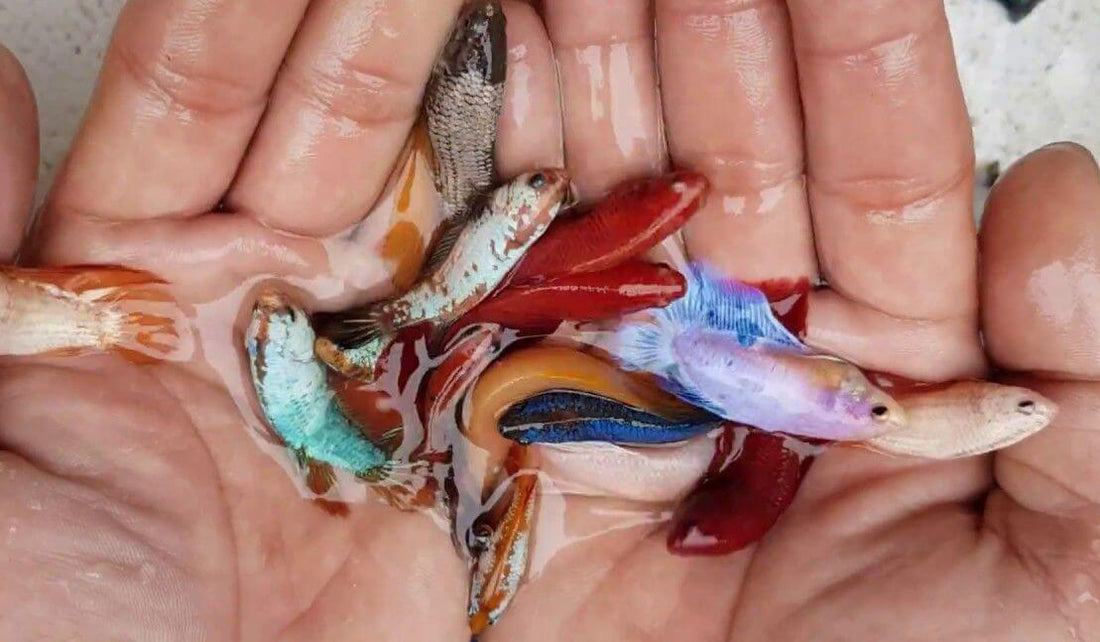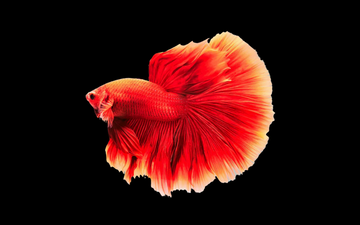Is My Betta Fish Dying? Common Betta Fish Behaviors Before Death

It’s never easy to think about, but knowing the signs that your betta fish might be dying can help you act quickly and possibly save them.
Bettas can show subtle changes in their behavior or appearance when they’re seriously ill or stressed.
If you notice your fish is losing color, not eating, or struggling to swim, these could be signs that something’s wrong.
By spotting these warning signs early, you have a better chance of helping your betta recover or at least making their final days more comfortable.
Signs Your Betta Fish Might Be Dying

When your Betta is approaching the end of its life, it might start showing specific behaviors that indicate something is seriously wrong.
1. Lethargy and Decreased Activity
One of the first signs that something is wrong with your Betta fish is a noticeable drop in energy. Betta fish are naturally curious and lively, often exploring their tank and flaring their fins.
However, if your Betta is dying, it will likely become lethargic, spending most of its time at the bottom of the tank or resting on plants and decorations.
Treatment:
- Check water parameters for toxins (ammonia, nitrites)
- Maintain consistent water temperature (78-80°F)
- Avoid overfeeding
2. Loss of Appetite
A sudden or gradual loss of appetite is a significant red flag.
Bettas usually have a healthy appetite, eagerly swimming to the top of the tank when it's feeding time. If your Betta begins to refuse food or spits it out, it could indicate that it is not feeling well.
Treatment:
- Check water quality for toxins
- Offer smaller, more appealing foods like live brine shrimp
- Avoid overfeeding, which could worsen the issue
3. Clamped Fins
Another behavior to watch for is clamped fins.
Normally, a Betta fish will display its fins in a relaxed, flowing manner. When a Betta's fins are clamped, it means they are held tightly against its body instead of fanning out. This is usually a clear indicator of distress.
Treatment:
- Check and improve water conditions
- Add aquarium salt to reduce stress
- Treat with anti-bacterial or anti-fungal medication if needed
4. Breathing Problems
One of the more noticeable behaviors you may witness before a Betta fish dies is labored breathing.
Bettas are labyrinth fish, which means they have a special organ that allows them to breathe air from the surface. While they typically swim to the surface occasionally, if you notice your Betta constantly gasping for air or struggling to breathe, it’s a sign that something is wrong.
Treatment:
- Test water for ammonia/nitrite spikes
- Increase oxygenation with an air stone or gentle filter adjustments
- Treat for bacterial infections or parasites that affect the gills
- Lower the water level slightly so it easier for the Betta to reach the surface
- Ensure the tank is properly filtered to maintain water quality
5. Discoloration
A healthy Betta is a bright, vibrant fish, with intense shades of red, blue, or other colors depending on the breed.
However, if your Betta is nearing death, you may notice its color fading or becoming dull. In extreme cases, the Betta might develop patches of pale skin or even turn a gray-ish or brown color.
Treatment:
- Check water parameters to reduce stress
- Offer a high-quality diet to boost health
- Treat for infections if discoloration worsens
6. Sitting at the Bottom of the Tank
While Bettas will occasionally rest at the bottom of their tank, prolonged periods of sitting without movement can be a worrying behavior.
If your Betta is spending most of its time lying at the bottom, this could indicate that it’s too weak or sick to swim.
Treatment:
- Test for toxins like ammonia or nitrites
- Provide a peaceful, calm environment
7. Hiding and Isolation
Betta fish are generally bold, often swimming to the front of the tank when people approach or interact with their environment.
If your Betta starts hiding more often or staying away from other fish (if it’s housed with tank mates), this could be a sign of distress.
Treatment:
- Reduce stressors in the environment (e.g., tank mates, loud noises)
- Provide a calm, quiet tank environment
- Check water conditions and treat for illness if needed
8. Skin Lesions or Fungus
Visible signs of disease like lesions, ulcers, or white cotton-like patches on the skin are serious indications that your Betta may be in its final stages of life.
These physical symptoms usually mean there is an underlying bacterial, fungal, or parasitic infection that could be fatal if not treated immediately.
Treatment:
- Isolate the fish to prevent the spread of infection
- Treat the water with antibacterial or antifungal medication
- Improve water quality to prevent further infections
- Add aquarium salt to aid healing and reduce stress
9. Fin Rot or Deterioration
Fin rot causes the Betta's fins to fray, turn black, or fall off, which can happen due to bacterial infections. If not treated promptly, fin rot can become severe and contribute to the Betta's decline in health.
Treatment:
- Use antibacterial medication
- Add aquarium salt to help heal the fins
10. Loss of Balance
If your Betta struggles to maintain its balance, floating upside down or sideways, it is a sign of swim bladder dysfunction or neurological issues.
In some cases, this behavior can be corrected with dietary adjustments, like feeding a cooked pea to ease constipation. However, if the problem persists, it’s likely a sign that your Betta is seriously ill.
Treatment:
- Fast the Betta for 24 hours and feed a cooked pea
- Test water quality for toxins
- Treat for swim bladder or neurological issues if no improvement is seen
What You Can Do If Your Betta Shows Signs of Decline

If your betta is displaying any of the warning signs mentioned earlier, it’s important to act quickly.
Here are some steps you can take to help your fish during this difficult time.
Check and Improve Water Quality
Start by testing the water with a good aquarium test kit. Look for harmful levels of ammonia, nitrites, nitrates, and check the pH balance. Keeping the water clean and toxin-free is crucial. Do partial water changes if necessary, and make sure the tank is maintained regularly—this includes cleaning the tank and changing the filter when needed. Good water quality can make a huge difference in your betta’s health.
Create a Comfortable Environment
Make sure your betta’s tank is set up in a way that minimizes stress:
- Your betta should have room to swim freely.
- Add some plants, caves, or other tank decorations where your fish can hide and feel secure.
- Use a heater to keep the water temperature steady within the ideal range (76-82°F).
- Keep a consistent light cycle, with some time for darkness to help your betta follow its natural routine.
Get Veterinary Help
If you think your betta is sick, it’s a good idea to consult a vet who has experience with fish or aquatic animals. They can diagnose the issue and recommend treatments, like antibiotics for infections or medications for parasites. Professional help can give your fish the best chance of recovery.
Consider Comfort Care
Sometimes, no treatment will be effective, especially if the betta is old or very ill. In this case, you can focus on making your fish as comfortable as possible. Keep the water clean, offer nutritious food, and try to reduce any stress. This kind of care ensures your betta is at peace during its final days.
How to Comfort Your Betta Fish in Its Final Days
If your betta fish is showing signs that it might be nearing the end, whether due to old age or serious health issues, there are some things you can do to make its last days as comfortable as possible. While some symptoms might still be treatable, it's important to prepare yourself for the possibility that your betta may be passing on.
Here’s how you can help make your betta more comfortable:
- Avoid sudden changes in the tank setup and reduce loud noises around it. Stress can make things worse for a sick or dying fish.
- Strong water currents can stress out a weakened betta, so make sure the filtration system is running gently to avoid causing discomfort.
- If your betta isn't eating, don’t force it to. You can try offering easy-to-digest foods like brine shrimp or daphnia, but if it refuses, it’s okay to stop trying.
- If your betta is in a community tank, it may be best to move it to its own quiet space. This will reduce any stress caused by other fish.
If some of these behaviors are treatable, it's always good to address the issue as early as possible. But if your betta is indeed nearing the end, providing a calm and comfortable environment is the kindest thing you can do.
When the time comes, if your betta is suffering, you may need to consider humane euthanasia. A quick overdose of clove oil is a widely accepted method to peacefully minimize any pain and suffering.
Caring for Your Betta in Its Final Days
Losing a betta fish can be difficult, but understanding their behaviors before death helps you prepare and provide the best care in their final days. Whether through improving water conditions, treating illnesses, or simply creating a peaceful environment, your efforts can make a meaningful difference.
In the end, ensuring your betta is comfortable and reducing stress is the most compassionate thing you can do, especially if recovery is no longer an option.
No comments











0 comments